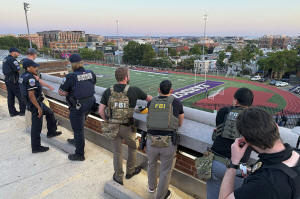Trump threatens to take over DC police again over immigration
enforcement
[September 16, 2025]
By GARY FIELDS and CHRIS MEGERIAN
WASHINGTON (AP) — President Donald Trump on Monday threatened to once
again federalize Washington, D.C.'s police force, in what he suggested
could come in response to the city's mayor's stated refusal to cooperate
with immigration enforcement.
Trump's emergency order, which took over the local police force, expired
last week. Hours before it elapsed, Mayor Muriel Bowser said that the
city would not cooperate with Immigration, Customs and Enforcement in
their continued operations in the nation's capital. Earlier, she had
said the city would work with other federal agencies even after the
emergency order expired.
In an early-morning social media post on Monday, Trump said his
intervention into the D.C.'s law enforcement had improved crime in the
city, a claim Bowser has backed up, though, data shows crime was already
falling in Washington before the law enforcement surge began.
Trump said crime could increase if cooperation on immigration
enforcement ceases, in which case he would "call a National Emergency,
and Federalize, if necessary!!!”
The mayor’s office declined to comment.
The White House did not say if Trump would follow through on his threat.
It also did not say whether the president had considered trying to
extend his previous order that placed the city's police force under
federal control. The order was not renewed by Congress and lapsed
September 11.
Later Monday, speaking in the Oval Office where he signed an order
sending the National Guard into Memphis, Trump said they would
federalize the police in Washington if they had to, “but we don’t have
to anymore, because it’s in such great shape.”

Bowser issued an order September 2, setting up how the local police will
continue working with the federal law enforcement agencies that continue
working in the city. The order listed a number of federal agencies she
anticipated working cooperatively with the MPD, the local police,
including the FBI, the Drug Enforcement Administration and the Secret
Service, among other agencies. Absent was ICE.
Speaking September 10 at a ribbon cutting ceremony, the mayor said
“immigration enforcement is not what MPD does,” referring to the local
police department. She added that when the emergency order ends, “it
won’t be what MPD does in the future.”
[to top of second column]
|

Officers from Metropolitan Police Department, FBI, and Homeland
Security Investigations (HSI), are seen monitoring a football game
between Bell Multicultural and Archbishop Carroll, Friday, Sept.,
12, 2025, at Cardozo High School in the Columbia Heights
neighborhood in Washington. (AP Photo/Pablo Martinez Monsivais)

Data analyzed by the Associated Press during the emergency period
showed that more than 40% of arrests were immigration related,
highlighting that the Trump administration continued to advance its
hardline immigration policies as it sought to fight crime in the
nation's capital.
Federal law enforcement agencies and National Guard units from D.C.
and eight states are continuing operations in the city. The
district's attorney general filed a lawsuit opposing the use of the
military in the city.
On Monday, a group of former civilian leaders and retired four-star
level officers weighed in on the case, highlighting what they said
were the dangers of presidents deploying the National Guard for law
enforcement, which they said could pose "safety concerns for
servicemembers and the public alike.” Among the officers, who served
during both Republican and Democratic administrations, was former
National Security Agency director Michael Hayden.
Trump's threat comes the same day that the House Committee on Rules
is taking up several D.C.-related bills, including a proposal to
lower the age at which juveniles can be tried to 14 from 16 for
certain serious crimes, as well as restricting the district's
authority over its sentencing laws and its role in selecting judges.
The bills passed out of the House Committee on Oversight and
Government Reform last week on a party-line vote.
The district is granted autonomy through a limited home rule
agreement passed in 1973, but federal political leaders retain
significant control over local affairs, including the approval of
the budget and laws passed by the D.C council.
All contents © copyright 2025 Associated Press. All rights reserved |